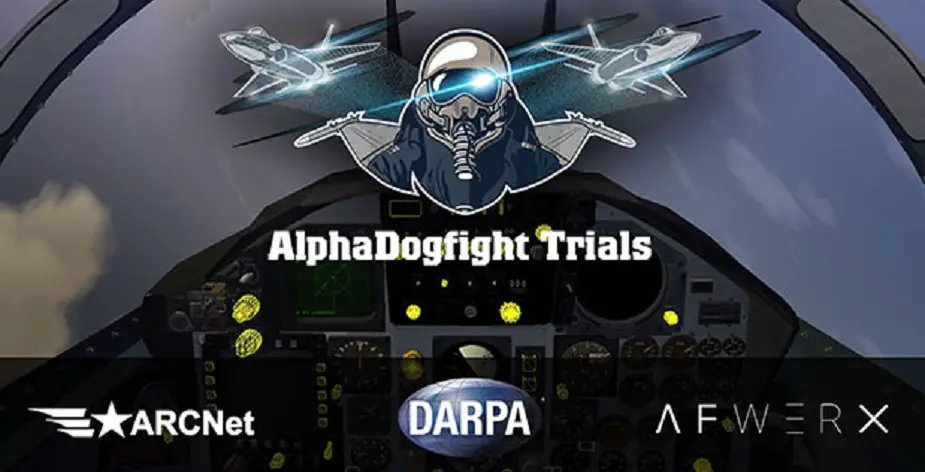Breaking news
DARPA picks teams for virtual air combat competition.
DARPA has selected eight teams to compete in the AlphaDogfight Trials, a virtual competition designed to demonstrate advanced artificial intelligence (AI) algorithms that can perform simulated within-visual-range air combat maneuvering, colloquially known as a dogfight.
 As modern warfare evolves to incorporate more human-machine teaming, DARPA seeks to automate air-to-air combat, enabling reaction times at machine speeds and freeing pilots to concentrate on the larger air battle (Picture source: DARPA )
As modern warfare evolves to incorporate more human-machine teaming, DARPA seeks to automate air-to-air combat, enabling reaction times at machine speeds and freeing pilots to concentrate on the larger air battle (Picture source: DARPA )
The Trials aim to energize and expand a base of AI developers and potential proposers prior to an anticipated algorithm-development solicitation to be released under DARPA’s Air Combat Evolution (ACE) program. Announced earlier this year, ACE seeks to automate air-to-air combat and build human trust in AI as a step toward improved human-machine teaming. DARPA’s vision is that with trusted AI able to manage lower-order operations, pilots could focus on higher-order strategic challenges such as orchestrating teams of unmanned aircraft across the battlespace under the Mosaic Warfare concept.
The Autonomy Research Collaboration Network (ARCNet) Consortium issued a solicitation for the AlphaDogfight Trials in the summer of 2019. The following eight organizations were chosen from a larger pool and are leading teams that will develop and demonstrate their dogfighting AIs in a series of three trials between November 2019 and March 2020:
- Aurora Flight Sciences
- EpiSCI
- Georgia Tech Research Institute
- Heron Systems
- Lockheed Martin
- Perspecta Labs
- physicsAI
- SoarTech
“There are a diversity of teams participating in the AlphaDogfight Trials – from a university research institute and small companies to a large defense contractor,” said Lt. Col. Dan “Animal” Javorsek, ACE program manager in DARPA’s Strategic Technology Office. “Each team provides a unique pedigree and approach to algorithm development that will make for a very interesting final competition.”
All eight teams will compete in each of the three scheduled trials. They will use the JSBSim open-source flight dynamics model for simulation environment and the open-source FlightGear Flight Simulator for the visual system. The simulated aircraft for the Trials is the publically available, unclassified FlightGear version of an F-15C fighter aircraft.
The first two trials will take place November 2019 and January 2020 near Baltimore at the Johns Hopkins University Applied Physics Laboratory, which is developing and managing the simulation air environment for the AlphaDogfight Trials. During the trials, teams will pit their AIs against DARPA-provided adversarial “Red” AIs in a series of one-versus-one dogfights. The level of difficulty will increase in the second trial.
The third and final trial will take place in two locations near Las Vegas March 2020, first at the Air Force’s innovation hub, AFWERX, and then at Nellis Air Force Base, Nevada. Teams will fly their AI algorithms against “Red” AIs as in the first two trials, but they’ll also compete against each other in a round-robin-style tournament. The final matchup between the top two AIs is scheduled to take place at Nellis AFB in front of a live audience of Air Force fighter pilots and the other contractor teams. The winning AI will then be matched in a simulated dogfight against a Weapons School fighter pilot while the other pilots observe and critique the live Weapons Officer in the final showdown.
Although there are no monetary prizes associated with any of the trials, all of the teams may benefit from demonstrating their technologies to potential Defense Department end users.
“Capping the AlphaDogfight Trials with a fly off against a human fighter pilot is the ‘grand prize,’” Javorsek said. “Warfighters trust things that work and this contest is the first step along the road to trusting this new kind of autonomy. In the larger ACE program we want to demonstrate that human pilots teamed with AI can achieve greater effects in aerial combat than either could achieve alone. Ultimately, ACE is about enabling human-machine teaming for complex air combat scenarios.”
The AlphaDogfight Trials are related to the ACE program but are not formally part of it. Proposers to the upcoming ACE solicitation on algorithm development are not required to be part of the Trials.






















